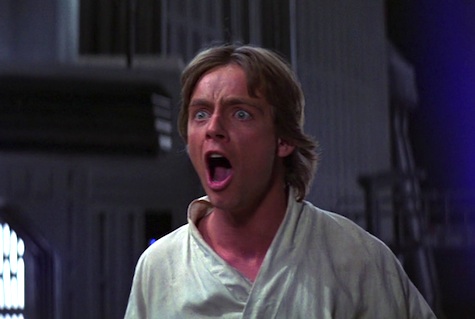Star Wars Episode VII has a title—The Force Awakens—now and it feels so weird to be reading about and speculating on a new Star Wars movie. Even as titles and plot details and set pictures leak out, it still doesn’t feel like it’s really happening.
I think it’s partially franchise exhaustion. I only have so much time to care about Marvel Cinematic Universes and DC Cinematic Universes and X-Men Cinematic Universes and Universal Monster Cinematic Universes and Hobbits and Ninja Turtles Jesus Yes Really and Pacific Rims and whatever the hell else is steamrolling over us in the next four years. The only reason Star Wars gets any space in that overcrowded toybox of the mind is because it withstands nostalgia better than most.
But it’s that nostalgia that I think is also the reason why The Force Awakens doesn’t feel real. I still vividly recall the excitement leading up to the release of the first prequel, The Phantom Menace. Star Wars was back and while we had grown up on the original trilogy, this one was ours. This was the Star Wars we’d be able to tell our kids about seeing for the first time.
And we all know how well that worked out.
So this new sequel trilogy, this veritable new hope, is something I’ve felt very cautious about. I want to believe that it’s going to feel like Star Wars and that it’s going to make the whole franchise feel real again. But I don’t want to be disappointed again, so I keep myself distant from the news and speculation in hopes that this will buffer me from any potential letdown.
But.
But there is one idea that I’d love to see play out on the big screen. An idea that I haven’t been able to let go of. An idea that isn’t all that great of an idea but oh gosh, the implications it would bring to this universe, to these heroes, would be grand indeed. An idea that I thought I had calmed down about (the first draft of this article was written in March 2014!) but which the revealed title of Star Wars Episode VII: The Force Awakens has brought roaring back.
I want Star Wars Episode VII to get rid of the Force. Even though the title says outright that the Force awakens. Here are five reasons why.
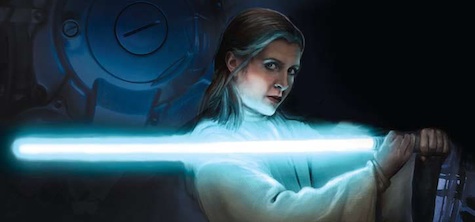
1.) Getting rid of the Force affects every character in a different way.
The most exciting aspect of The Force Awakens is that we’ll get to see what happened to Luke, Leia, and Han after Return of the Jedi. The decades-long popularity of the Expanded/Legacy universe is based in this concept. We want to know everything about our original trilogy heroes, because the end of the story left open so much possibility for their future direction. Although preferably we want to see them be the heroes we remember them being just one last time.
And to do that you need a plot that’s going to affect these three central figures. A struggle to get rid of the Force, or to stop the Force from disappearing, would obviously affect Luke, but it could also have serious ramifications for Leia and Han, as well.
Imagine that getting rid of the Force starts as a legislative decision made by a new galactic government and that Leia was the leader of, or at least part of, that legislative body. Maybe there’s another Sith on the loose (Episode VII concept art shows an ominous hooded cyborg cradling Vader’s helmet, after all) and after the Emperor everyone has just had enough and starts exploring the option of a Jedi-less and/or Force-less galaxy.
There are some logical arguments to be made for sealing the Force off from potential Force users. You ensure that disasters like the Emperor can never happen again and you don’t have to be worried about policing a galactic population full of Jedi who no longer have any organization of their own. What if someone figures out a way to do this without severing individual Jedi from the Force through surgery, genetic manipulation, or anything else invasive?
Leia would be forced to argue this issue in the government, she would be forced to choose between hurting herself and her family and ensuring the greater good of the galaxy. How does Leia solve problems like this? Does she compromise or is she a hardline politician? Getting rid of the Force puts everything she loves is in peril, and it could come down to her making that peril a reality with a single signature of approval. Does she refuse? Does she go ahead?
Even if there is no governmental push to tap off the Force, Leia still retains a huge personal stake in the Force vanishing, since she, and presumably at least one of her kids, are Force-sensitive.
Han wouldn’t suffer the personal loss of the Force like Leia, but if he and Leia have a family of Force-users, that puts him in a unique position. The person or group proposing a Force-less galaxy would sure seem fishy to Han, don’t you think? And even though he’s a hero of the Rebellion and related to two galactic figureheads, few people would notice if he and Chewie slipped away in the Falcon to get to the bottom of this getting-rid-of-the-Force-business.
Han also provides an important perspective for the audience in regards to being incapable of understanding or experiencing the Force. He’s uniquely positioned to ask Luke and Leia if it would be so bad if the Force was gone, allowing us to hear from them just how devastating it would be to lose their abilities, further allowing us to learn the intricacies of how the Force affects you on a day-to-day basis and how it widens your understanding of life itself. Through Han, we could get a much deeper perspective on this mystical aspect of the Star Wars universe.
Regardless of his own feelings, in the end getting rid of the Force threatens his family. And that probably includes his children. And while we’ve seen Han brought low, or pop up winningly in impossible situations, we’ve never seen someone as cunning as Han decide that he’s coming after you. And a righteously pissed Harrison Ford is a joy to behold.
Seriously, if Han decides he is going to take you out then you are fucked. His Wookiee lifemate will tear your limbs off, his wife will send entire fleets to melt your planet into slag, his lifelong business associate will snake your finances out from under you…remember Jabba the Hutt? Yeah, no one does because Han’s probably-brother-in-law destroyed his entire operation like 30 years ago with little more than a glowy sword and two bumbling droids. And if you somehow manage to escape all of that? Boba Fett probably owes Han a favor by this point. Enjoy your explody space death!
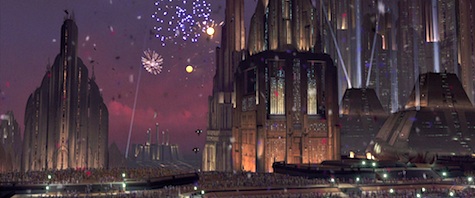
2.) Getting rid of the Force immediately defines the post-Empire era with a single event that has a large number of repercussions.
A unique hurdle that the Star Wars sequel trilogy will have to overcome is introducing us to characters that we’ve never heard of. We faced this with the prequel trilogy, but even then we still knew of a lot of the characters even if we didn’t yet know that theyssa would turn out to be dumber than a bag of poodoo.
More importantly, we already knew the larger context that these characters would be operating within. We’d be getting to know Anakin and Obi-Wan and Padme and Palpatine as the Old Republic crumbled around them, as war and fascism gripped the galaxy, and no amount of pod racing could distract us from the knowledge that we were not heading towards a happy ending.
The context of the Star Wars sequel trilogy is a mystery, though, and that will make it harder to explain what motivates new characters towards conflict. The sequel trilogy could take a page from Star Wars Episode IV, the only other instance in the franchise where brand new situations and characters were introduced, and just start fresh with new faces, locations, and conflicts. And judging from some of the rumors and concept art, it seems like it will be doing exactly that, albeit in the physical trappings of the old conflict.
But do we want to see Episode IV duplicated? Will we see new characters slowly coming together to form a rebellion? Against what? Against the characters of the original trilogy? Why would we want to see those beloved characters grown shiftless and evil? Maybe Luke, Leia, and Han are still fighting a rebellion against a persistent Empire and the new characters join them. But that’s a pretty depressing thought in itself. Have they really made no progress in decades?
Any new context in the Star Wars sequel trilogy will have to avoid undercutting the characters in the original trilogy while not entirely retiring them. That’s a tall order, but getting rid of the Force provides a possible way to do this. We’ve realized how that would affect the characters of the original trilogy, but that kind of event would also provide an immediate crisis for any new characters, as well.
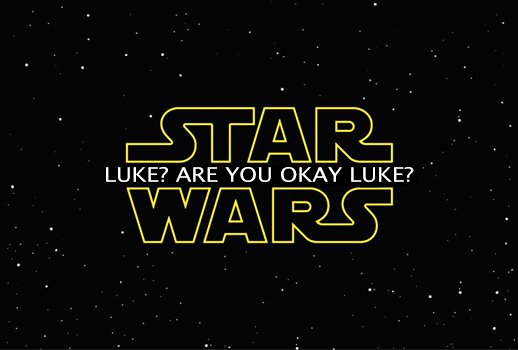
At least some of our new characters are bound to be the offspring of the characters from the original trilogy. (Just like some of the characters of the original trilogy were the offspring of characters from the prequel trilogy.) That means some of the new characters will be new Force-sensitives, and probably some of the first in a brand new generation of Jedi. Since it has been revealed that the new trilogy will start 30-ish years after Return of the Jedi, that means the Jedi Order might have only just re-achieved some form of stability, order, and influence. Either that or there isn’t ANY Jedi Order, but in the end the consequence is the same: Getting rid of the Force strips an entire generation of Jedi and/or Force-users of their inheritance. The reactions to that are bound to be varied, and give us an easy way to sympathize and understand these new characters.
Basically, it turns this:
“Hi, I’m promising new teenage Jedi Zap Rowsdower and I just saved you from that nest of gundarks! Let’s have a pizza party!”
Into this:
“Hi, I’m promising new teenage Jedi Zap Rowsdower and I’ll be damned if I let some politician treat me like a weapon instead of a person. Even if that politician is probably played by Benedict Cumberbatch, because that guy is everywhere these days.”
You don’t even have to do this with all Force-users, just some of them. Turning a have into a have-not is another way to create drama that allows us to get to know these characters better.

3.) It’s not just another war…but it still allows for daring battles.
The series is called Star Wars so let’s see some wars amongst the stars! But…different than the ones that included massive amounts of ships, CGI clones, lightsaber duels, and people flying in and around a Death Star.
Getting rid of the Force hinders this goal, actually. Without the Force there’s nothing that allows really cool duels and that just leaves us with the same space battles we’ve seen in the last six movies.
But really, that just means you have to keep following the idea of getting rid of the Force to further extrapolation. Over and over in the movies, we’ve heard that the Force is intrinsic to life. It’s more than just a fun way to do flippies in the air, it’s a fundamental aspect of the galaxy, like gravity. What happens if the Force’s affects on the galaxy disappear? It would do more than just make Force users sad. Something else, something bigger, would happen.
What if the omnipresent will of the Force, along with giving Jedi something to brag about, was also keeping something out? Something old and unknowable and dark? Something straight up wrong? Something that can be shot at with X-Wings without getting the pilots into moral quandaries?
And…something that can take a myriad of forms! What if these things are shadowy and sort of biological and creepily adaptable? What if one day you get a rain of locusts and the next you get a planet-eating goliath? (Very Yuuzhan Vong-ish, this idea, I know.) We’d see lots of hotshot maneuvers from plucky X-Wing pilots, that’s for sure, with ingenious defenses, thrilling chases, and terrible catastrophes. Imagine the mind-bending duels that could occur with shadowy creatures that generate two limbs for every one you chop away with your lightsaber. What are you going to do? Especially without the Force to back you up?
Not having the Force to back you up is key. If the sequel trilogy uses that as the defining conflict then we have to see it succeed, otherwise there are no stakes, no setbacks, and certainly not enough conflict to fill three (or more) movies. Sure, they have to get the Force back eventually, but it would be exciting to see our heroes being brought low and then rising to the impossible challenge before them. Those impossible odds are what hooked us in the original trilogy, after all.
Plus, having Luke, Leia, Han, et al take back the Force allows the sequel trilogy to do something truly fascinating.
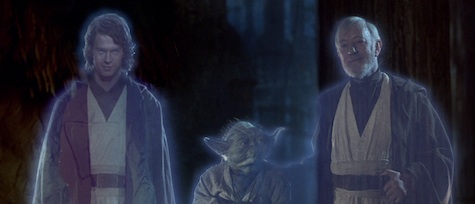
4.) It provides a new threat that allows us to learn more about the conflicts in the previous trilogies, and the Force itself.
The Force is…so weird. Are there even rules to it? There seem to be. I mean, the Jedi Order in the prequel trilogy were so hard on about them that Anakin went nuts trying to obey them. (And then Darth Vader snapped and threw the Emperor down a pit trying to obey the other set of rules.) But Luke doesn’t seem to follow those rules in the original trilogy; he straight up Force-chokes people in Jabba’s Palace. And he still gets to save the galaxy and get home in time to see the Force ghosts of all of his teachers give him the thumbs up.
Oh yeah, those Force ghosts. What’s up with them? Apparently this is an ability that the Jedi had to rediscover, which is kind of baffling when you think about their numbers in the prequel era. So Qui-Gon just…figures it out in a way that generations full of other Jedi couldn’t? (Did he acquire it in a game of chance? What gives?) And then Liam Neeson’s ghost told Yoda and Obi-Wan how to pull it off? But who told Anakin?
And Anakin was a virgin birth because the will of the Force just…had to?
And midi-chlorians?
WHAT THE HELL IS ANYTHING.
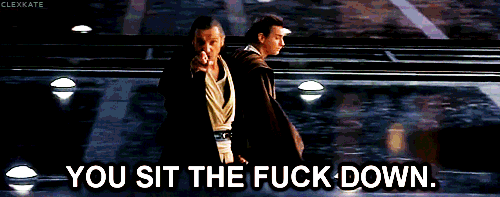
Qui-Gon’s revelation of Force ghost abilities can at least be explained. Obi-Wan states in The Phantom Menace that if Qui-Gon would follow the Jedi code he would be on the Jedi Council, our strongest indicator that Jinn does things his own way, according to his own morality. He’s unorthodox and more open-minded to doing things with the Force that other Jedi wouldn’t realize a need for. (Yoda’s cool and all, but it’s still hard to imagine him thinking, “DUDE, I WONDER IF COULD USE THE FORCE TO BE A GHOST.”) Whereas that was probably the first thing a crunchy crusader like Qui-Gon thought after taking a long pull on a death stick.
That unorthodox approach mirrors Luke’s in the original trilogy, and from there it’s not hard to imagine that this is the “balance” to the Force to which the prophecy in Episode I was referring. The rigidity that the Light side of the Force insisted on made them vulnerable to the flexibility of the Dark side of the Force and before you knew it things were getting seriously Order 66-ish across the galaxy. The Emperor slaughtering the old Order and Anakin producing Luke and Leia restored Jedi to the galaxy who could grow up utilizing the Force in a flexible fashion, crossing between traditionally Light and Dark tactics. The Emperor’s death and Vader’s redemption are the fulfillment of this prophecy.
This is all theory and speculation, but by focusing the conflict around the presence of the Force, the sequel trilogy has an opportunity to flesh out the nature of the Force and either make this all overt canon or offer its own exploration of the prophecy, Light and Dark, and the mechanics of the Force.
What if Luke is training an entirely new Jedi Order under these flexible rules? He would probably try to commune with his teachers a lot just to make sure he’s doing it right. This means we’d get to see Yoda and McGregor’s Obi-Wan again. And we could get really interesting character meet-ups like, Qui-Gon and Luke, that would really knit together the previous two trilogies into a cohesive timeline. Luke taking advice from Qui-Gon would enhance that character’s actions in the dodgily-plotted prequel trilogy just by virtue of proving that Qui-Gon’s actions mattered decades after they were committed.
Most importantly, we could have scenes between Luke, Leia, and their father Anakin. The kids can get to know their father in a way that shouldn’t be possible, and thus the audience could them and their history better. This would give Anakin an opportunity to lament his actions from the prequels, as well, and provide a new perspective to them that would help those movies make more sense. I can hear the internet groaning at the prospect of seeing Hayden Christensen again, but honestly, I think he deserves another crack at Anakin under a director who will actually bother to give him more direction than “Pretend you’re in love” or “Jump over that green block then duck under the next one.”
This mixture of original, prequel, and sequel casts provides a lot of different perspectives, and if the threat is Force-related that means all of them really need to define just what the Force IS and why they need it so badly. And with a deft touch, this can be done without sacrificing the mystique of the Force as outer space magic.
Which brings me to my final argument.
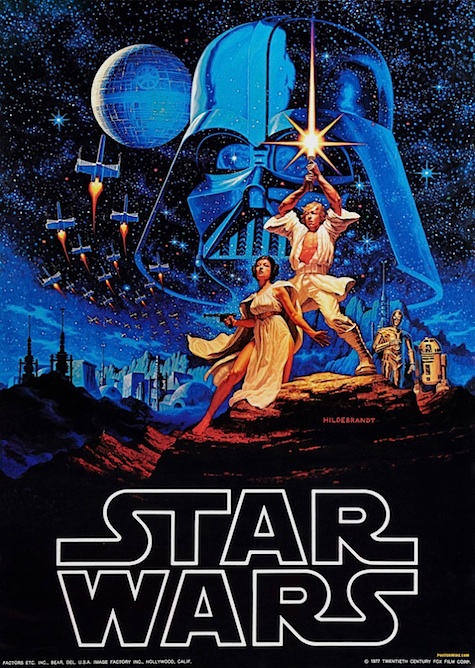
5.) Getting rid of the Force preserves the science-fantasy structure of the series.
Star Wars has never been entirely sci-fi and it has never been entirely fantasy, but rather an inarguably appealing mixture of the two. The Force functions as a traditional fantasy magic system in regard to how the characters use it, and while we’ve faced off against science fiction threats like the Death Star and seen how magic can avert the course of an entire galaxy’s political sytem, we’ve never quite dug into the magic itself.
And although Star Wars is a franchise that brings to mind visions of spaceships, blasters, droids, and more, in the end all six movies are bound together by the presence, absence, and use of the Force.
It surrounds the movies, penetrates them, binds them. And if a third trilogy must be made then its story has a responsibility to avoid being a soulless cash-in and to utilize what came before in order to enable a deeper understanding of this epic, its settings, and its characters. (And with a title like The Force Awakens, one wonders if they are taking this sentiment to heart.) The prequel trilogy gave us a richer understanding of the events leading to the Empire. The original trilogy gave us a thrilling understanding of how this galaxy functions under tyranny.
What will the sequel trilogy illuminate? I don’t know, but I obviously have an idea, and that idea ends with our heroes triumphant, having returned the Force to the galaxy and gained a crucial, deeper understanding of how it works within us. Then, finally, these words:
“The Force will be with us. Always.”
I’ve obviously given this idea a lot of thought, but I won’t be saddened if it doesn’t come to pass. (Actually, I’d be a little weirded out.) It’s not the only idea as to what the story of Star Wars Episode VII: The Force Awakens could be; and considering the sheer legion of fans waiting to see how the new trilogy unfolds it doesn’t seem possible that whatever story there is will please everyone.
In fact, the power of that expectation is a little frightening because of that very vacuum. Episode VII is playing with a story that engenders so much devotion that it’s become its own culture. In that sense, postulating a possible story for the Star Wars sequels is a dangerous move, one that could be taken as an imposition of my own will, my own wishes, over other fans who have wishes that are just as valid.
But it’s that validity that makes wondering about Episode VII exciting in the first place. What you personally want to see might just show up on the big screen, finally, after all this time, after the disappointment of other Star Wars movies or projects! That’s thrilling.
In the end, we can’t hold off our hope for these new movies. What do you want to see up on that screen come Christmas 2015? How would you want to see your heroes sent off? What would make Star Wars Episode VII: The Force Awakens a worthy addition to the Star Wars universe?
Personally, Chris Lough would appreciate the addition of the Force to the present day, even though he would mostly just use it to float his cat around.










